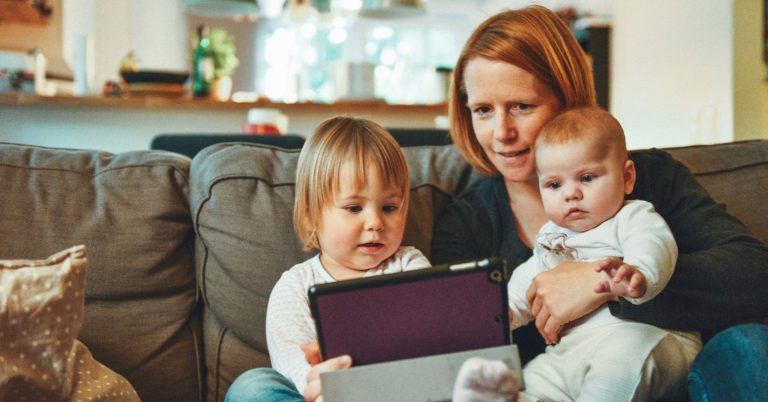This season, many customers have expressed anxiety and stress due to political differences with their families. Anticipating cruel reprimands, aggressive arguments, and insensitive remarks can leave many people with a knot in their stomach and tightness in their chest. They dread holiday gatherings and expect fakes happiness and harmony.

Source: Photo by Hannah Busing on Unsplash
I work with a couple I’ll call James and Maddie. This year, they welcomed their first child and longed to share that joy with their extended family. Unfortunately, James had two young nephews who were not vaccinated against childhood diseases. James’ sister and brother-in-law, influenced by the online anti-vaccination movement, became angry when James and Maddie refused to attend Thanksgiving with their newborn.
James and Maddie cried as they described long email tirades between their families. James emailed his sister research showing the effectiveness of childhood vaccines in preventing life-threatening illnesses (Talbird, et al., 2022). His sister responded with emails calling them “morons” and “brainwashed.” The angry comments seemed petty and left them deprived of their family connections during the first holiday season of their baby’s life.
The importance of social support
A large body of research shows the relationship between health, well-being, and family support (Thomas, et al., 2017). A strong family acts as a buffer against stress. Those who stay connected with loving family members enjoy better health and happiness (Thoits, 2010). Warm relationships encourage healthy behaviors, adding to the physical and psychological benefits of family support (Reczek et al., 2014).
Positive family ties reduce the body’s allostatic load (physiological wear and tear). Healthy relationships strengthen both the immune system and the functioning of the cardiovascular system. Whether hostile or loving, our bodies feel the effects of our relationships (Seeman et al., 2002).
Navigating Family Discord During the Holidays
The heartbreak of family strife is felt hardest during the holidays. The end of each year inspires reflections on family history, childhood traditions, and remembering those we have lost. Shorter days and colder weather can create a melancholy mood for many. Connection to family can seem both impossible and desperately necessary.
During family conflict, we become hyperfocused on our own point of view. James felt so angry because his sister wouldn’t vaccinate her children that he couldn’t see past her perspective. James and Maddie decided to stay away to protect their newborn. James blamed his sister for ruining the vacation.
For other families, the choice to attend or host holiday events is emotionally and physically taxing. Political polarization fractures and harms family relationships. We sometimes forget it policy is temporary, but family is eternal. When our hearts are hurting in the moment, it can be helpful to take a longer-term view.
I often ask my clients, “If a member of your family was injured in a car accident and hospitalized, would you rush to the hospital or stay away due to political differences?” Some people feel so insecure in their family that even a hospital emergency cannot break the separation.
Frustration over differences can sometimes seem crucial, like James and Maddie’s decision to protect their newborn. Yet, over time, these differences can change. This helps sow the seeds of reconciliation.
James and Maddie told the family they were following their pediatrician’s advice. When everyone in the family is vaccinated, it creates a “circle of safety” to protect the newborn’s fragile immune system. If family members had updated their vaccinations, they were welcome. Otherwise, the family will have to wait to see the baby until they and the child are fully vaccinated.
I encouraged James and Maddie to take a long-term view of their family relationships. A vacation without extended family was not a permanent condition.
Over time, relationships can and do improve. Try these proven suggestions:
- Respect autonomy and treat with dignity: Each member of the family has the right to make their own decisions. Take responsibility for your own choices and treat others with respect. You can disagree and still be kind.
- Do not label or stereotype: Each family member has a compelling reason for their choices. When we call someone an “idiot,” a “lib-late,” or any other derogatory comment, we distort and diminish their humanity. We don’t like it, so we shouldn’t do it. Additionally, negative labels restrict our thinking and fuel more conflict.
- Share something positive and uplifting: Communicate your love and care. Bring a story, game, delicious food, or funny joke to share if you plan to potentially attend stressful family reunions. Focus on how you can make the vacation better for you and your family. We feel uplifted when we focus on uplifting others (Curry, et al., 2018).
- Don’t “should” yourself: Our suffering is amplified when we focus on how we imagine events “should” unfold. Our expectations fuel our discontent. Instead of dwelling on how we think others should behave, it helps to accept reality as it is. We do better when we adapt flexibly to reality instead of dwelling on our rigid expectations of others. Mental flexibility is a sign of mental health (Kashdan, et al., 2010).
James and Maddie agreed that their disappointment with the vaccination issue and the stress of having a first child amplified their hurt feelings. They recognized their own disrespectful behavior and wanted to make choices that would allow for the family’s healing in the future. James called his sister and apologized for his intense anger and disrespectful language. In turn, her sister apologized for her meanness and hurtful comments. They admitted that they loved each other and that their relationship mattered.
James and Maddie agreed that they would not join the traditional big family reunion this year at his parents’ home. I encouraged them to cultivate happy traditions for their new family. Their mood brightened as they focused on the fun projects they could come up with together. Home for the holidays meant something different this year. They opened their hearts to the possibility of joy.


